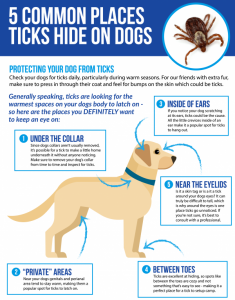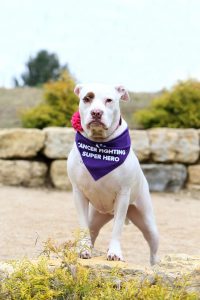
“For me a house or an apartment becomes a home when you add one set of four legs, a happy tail, and that indescribable measure of love that we call a dog.” ― Roger Caras
In This Issue: Make Your Dog a Star in Our 2020 “Cancer Can’t Keep a Good Dog Down” Calendar Contest; May is Lyme Disease Awareness Month; Clinical trial begins to test universal vaccine against canine cancer; OSU study: Removing dogs’ tumors sharply cuts cancer recurrence; Pups of the Month: Daisy and Winston.
Make Your Dog a Star!

Want To Make Your Dog A Star?
Now’s your chance to show the world what makes your dog an outstanding member of your family!
The Puppy Up Foundation is excited to announce the opening of our 2020 Cancer Can’t Keep A Good Dog Down Calendar Contest! This is the 12th year of producing this beautiful tribute to Cancer Heroes everywhere.
Enter the contest to HONOR your personal canine cancer hero, PROMOTE awareness of canine cancer and FUNDRAISE for cancer research to benefit pets and people.
Who can enter? Anyone with a dog who currently has or has had cancer (living or passed), including dogs who have entered before.
How do I enter the contest? Register your dog as a participant in the contest ($25 entry fee).
If you want to enter more than 1 dog, there will be a separate registration with fee for each of them.
What do I do next? Customize your fundraising page with their photo and their story, showing how cancer has touched their life and yours.
Share your page with friends and family. Ask them for help in promoting your dog.
How does voting work? Voting begins as soon as you enter and ends at midnight, EDT on June 30th.
Your $25 registration fee applies as 25 votes for your dog. Votes are $1.00 each; minimum donation is $5.00.
Your voting dollars go to fund cutting-edge research in comparative oncology, that branch of research that benefits both companion animals and humans in our fight against cancer.
Who wins? A minimum of 13 pets with the highest number of votes win a prominent place in the calendar with their photo and story.
Any pet with a minimum of 50 votes will be included in the calendar gallery.
Click HERE to register and start your dog’s path to fame!
If you have any questions about the contest, or technical issues, please contact calendar@puppyup.org.
Good luck!
May Is Lyme Disease Awareness Month

Lyme disease in dogs is one of the most common tick-transmitted diseases in the world, but it only causes symptoms in 10 percent of affected dogs. When infection leads to Lyme disease in dogs, the dominant clinical feature is recurrent lameness due to inflammation of the joints, and a general feeling of malaise. There may also be depression and a lack of appetite. More serious complications include damage to the kidneys, and rarely, heart or nervous system disease.
Transmission of Lyme disease has been reported in dogs throughout the United States and Europe, but is most prevalent in the upper Midwestern states, the Atlantic seaboard and the Pacific coastal states. However, the disease is spreading and becoming more common throughout the United States.
Symptoms of Lyme Disease in Dogs
Many dogs who develop Lyme disease have recurrent lameness due to inflammation of the joints. Sometimes the lameness lasts for only three to four days but recurs days to weeks later, either in the same leg or in other legs. This is known as “shifting-leg lameness.” One or more joints may be swollen, warm and painful.
Some dogs may also develop kidney problems. Lyme disease sometimes leads to glomerulonephritis—
Eventually, kidney failure may set in as the dog begins to exhibit such signs as vomiting, diarrhea, lack of appetite, weight loss, increased urination and thirst, and abnormal fluid buildups.
Other symptoms associated with Lyme disease in dogs include:
· Stiff walk with an arched back
· Sensitivity to touch
· Difficulty breathing
· Fever, lack of appetite, and depression
· Superficial lymph nodes close to the site of the infecting tick bite may be swollen
· Heart abnormalities are reported, but rare
· Nervous system complications (rare)
Causes of Lyme Disease in Dogs
Lyme disease is caused by a spirochete (bacteria) of the Borrelia burgdorferi species. Borrelia burgdorferi is transmitted by slow-feeding, hard-shelled deer ticks (Ixodes spp.). Infection typically occurs after the Borrelia-carrying tick has been attached to the dog for at least 48 hours.
For the rest of the article, please follow this link.
Clinical Trial Begins To Test Universal Vaccine Against Canine Cancer

Trilly, a nine-year-old Gordon Setter, received the very first vaccine in the Vaccination Against Canine Cancer Study, a five-year clinical trial to evaluate a vaccine strategy for the prevention, rather than the treatment, of cancer in dogs. With more than 800 patients enrolled, it is the largest clinical trial conducted to date across the history of veterinary medicine. PHOTO BY MEGHAN LEPISTO
On Thursday, May 2, the very first dog received the very first vaccine intended to protect her from cancer. And soon after the 9-year-old Gordon setter named Trilly received her shot, so, too, did Norton, a 9-year-old rat terrier mix.
“We’re testing a totally novel way of creating an anti-cancer immune response,” says David Vail, a professor and board-certified oncologist at the University of Wisconsin–Madison School of Veterinary Medicine. “The holy grail would be to prevent cancer as opposed to waiting for it to start and then treating it.”
If the vaccine works in dogs, Vail says, it may not only provide a new strategy for addressing a critical canine health concern, it might also work in people.
The Vaccination Against Canine Cancer Study, now underway, will evaluate a vaccine strategy for the prevention of cancer in dogs. Much like an influenza vaccine bolsters the body’s readiness to fight the flu, this preventative vaccine follows the same principle, “to have the immune system primed such that if a cancer cell develops, it will attack,” Vail says.
More than 800 patients are enrolled in the study, making it the largest clinical trial conducted to date for canine cancer, and across the history of veterinary medicine. The UW School of Veterinary Medicine is one of three participating institutions.
Cancer is the number one cause of illness and death in the aging dog population, with approximately one out of every three dogs affected and six million new cancer diagnoses made in dogs each year.
For the rest of the article, please follow this link.
From Science Blog
OSU Study: Removing Dogs’ Tumors Sharply Cuts Cancer Recurrance.
The relative risk of a recurrence of cancer is reduced by 60% in dogs whose tumors are completely removed, a new analysis by Oregon State University researchers has found.
The researchers reviewed published veterinary studies and found a recurrence of less than 10% in dogs where the soft tissue sarcoma was completely excised, versus 33% recurrence in cases where the cancer was incompletely excised, meaning there was microscopic evidence that tumor cells remained after surgery.
“You want to get all of the tumor out if you can,” said Milan Milovancev, an associate professor of small animal surgery in the Carlson College of Veterinary Medicine and lead author of the study.
“That’s what most veterinarians, including myself, have thought, but this makes it more official. Now we can say, here’s the data.”
The findings were published recently in the journal Veterinary and Comparative Oncology. Co-authors are Veronica Irvin, an assistant professor in Oregon State’s College of Public Health and Human Sciences; Katy Townsend, an assistant professor in the Carlson College of Veterinary Medicine; and Joanne Tuohy of Colorado State University.
The study is a meta-analysis – an analysis of existing studies, used to identify overall trends – of canine soft tissue sarcoma. Meta-analyses are not common in the relatively young field of veterinary medicine research, but likely will be used more as the field moves toward more evidence-based research practices, Milovancev said.
The body of research on removal of soft tissue sarcoma in dogs offered conflicting information to veterinarians, which made the topic a good one for a meta-analysis. Milovancev approached Irvin, a public health researcher, for assistance with the study because these types of studies are much more common in human health research.
“Meta-analysis is seen as the best science,” said Irvin, whose research interests include transparency in reporting scientific research and outcomes. “This kind of work fits with mine because it raises questions about how we make veterinary medicine more transparent and rigorous.”
A meta-analysis provides researchers the opportunity to combine data from multiple studies and increase statistical power of the findings, uncovering results that could be missed in any of the smaller, individual studies.
For the rest of the article, please follow this link.
From KTVZ
Pups of the Month — Canine Cancer Heroes, Daisy and Winston
This month we’re featuring two pups of the month, our canine cancer heroes: Daisy – Madison’s PuppyUp Walk Canine Cancer Hero, and Winston, Nashville’s PuppyUp Walk Canine Cancer Hero.
What Is A Canine Cancer Hero?
For each PuppyUp Walk, the Event Manager and Walk Team select both a Human Cancer Hero and a Canine Cancer Hero, to be honored during the Walk ceremonies. These Heroes are chosen because of their exemplary attitude towards their particular type of cancer, showing bravery and hopefulness in their fight against this terrible disease.

Daisy
Daisy — Madison, Wisconsin’s PuppyUp Walk Canine Cancer Hero
Daisy is a 4 year old pit bull mix who was rescued at the age of 1.5 years by her forever mom, Jennifer Zehe. In October 2018, without warning, Daisy showed unusual symptoms, the most prevalent being a sunken portion of her face. She was immediately taken to a vet who diagnosed Daisy with “Trigeminal Nerve Sheath Tumor”, a condition which usually kills a dog within one year. Jennifer was given basically 2 choices by her vet. The first would be surgery, followed up with radiation and no guarantee that the tumor could be completely removed. This tumor also has a history of recurring. The other option Jennifer was given was to approach Daisy’s condition as holistically as possible. With strong support from her vet and plenty of research, Jennifer decided to take this approach, putting Daisy on a raw food diet, and giving her CBD oil, turmeric, and frankincense oil. Today, four months later, Daisy has shown signs of improvement and no decline. She has regained about 90% of the muscle in her face which she had previously lost, and she is a happy, healthy pup who loves to eat!

Winston
Winston — Nashville, Tennessee’s PuppyUp Walk Canine Cancer Hero
We adopted Winston when he was just shy of three years old. Putting his strikingly handsome appearance aside, Winston’s personality, cuddliness and expressive eyes won us over. We quickly fell in love with each other. He is the most loyal miniature-schnauzer you could ever meet.
After moving to Nashville, we took Winston on short hikes to Hidden Lake and through the Warner Parks. But earlier this year we began to see Winston get very tired very quickly. We knew something wasn’t quite right. And he was having a hard time keeping his meals down.
After several visits, our vet recommended taking ultrasounds.
The ultrasound revealed a lemon-sized tumor on Winston’s left adrenal gland, very close to his kidney and the vena cava (the main vein that runs to his heart). This news was devastating. Dad had just lost his own mother to cancer in December, and Winston had been a shoulder to lean on.
The vet said removing the mass sooner than later would be the best option, as he believed the tumor was rapidly growing. We met the oncologist and surgeon who said we could try treatments to slow the growth of the tumor, but doing so might only prolong his life 6 months or a year — removing the tumor was the only chance for Winston. We proceeded with surgery.
Surgery went well. The tumor, although very large and difficult to remove, did not attach to either his kidney or the vena cava.
After a few difficult days, Winston began to make great progress. His swelling went down and the large incision that went nearly the entire length of his underside began to heal. Winston really was going to be o.k. and he had proven just how tough and mighty a mini-schnauzer could be. We are so very thankful for our vet, Dr. Bush at Beauchamp’s Animal Hospital and especially for Winston’s surgeon, Dr. Streppa at Nashville Veterinary Specialists for performing a successful surgery.
Today, Winston is doing extremely well. He has shown us strength we never knew he had and has proven to us that you can defeat cancer.
John & Rachel Morgan
We’d love to see you and your pups at one of our PuppyUp Walks. If there is not one in your area, please follow this link and learn how you can make one happen. And check back often to our upcoming walks, as we are booking walks around the country throughout the year. Puppy Up!
Kroger Community Rewards Program
Helping The Puppy Up Foundation
Every time you shop at Kroger and use your Rewards Plus Card you can help us earn money. All you have to do is log in to your Kroger account and click on Community Awards. Search for The Puppy Up Foundation either by name or IQ193 and click enroll. Don’t forget to use your card each time you shop at any Kroger.
Thank you for your support!
We can always use your help. If you’re interested, send me an mail at ginger@puppyup.org.
Sincerely,
Ginger Morgan, Executive Director
The Puppy Up Foundation








